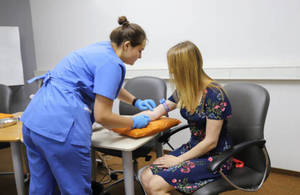New research shows 2 million people may have had long COVID
Findings from the REACT-2 studies show over a third of people who had coronavirus (COVID-19) reported symptoms lasting at least 12 weeks.

-
This amounts to 5.8% of the whole study population, with 2% reporting severe symptoms
-
Prevalence of long COVID increased with age and was higher among women
Over 2 million people in England are thought to have had one or more COVID-19 symptoms lasting at least 12 weeks according to one of the largest studies of the virus funded by the government.
The study is based on self-reported data from 508,707 adults aged 18 and above who took part in REACT-2 rounds 3 to 5 carried out between September 2020 and February 2021.
Around a fifth of those surveyed reported having had a COVID-19 symptom previously, with over a third reporting persistent symptoms lasting at least 12 weeks. Around a tenth of those with symptoms said they lasted at least 12 weeks and were severe.
The findings suggest prevalence of persistent symptoms, or long COVID, increases with age, with a 3.5% increase in likelihood in each decade of life. It shows long COVID is higher among women, people who are overweight or obese, who smoke, live in deprived areas, or had been admitted to hospital. Persistent COVID-19 symptoms were lower in people of Asian ethnicity.
Health and Social Care Secretary, Matt Hancock said:
Long COVID can have a lasting and debilitating impact on the lives of those affected. Studies like this help us to rapidly build our understanding of the impact of the condition and we are using these findings and other new research to develop support and treatments.
We are learning more about long COVID all the time and have made £50 million of research funding available to support innovative projects, with clinics established across the country to help improve the treatment available.
COVID-19 is still a relatively new disease and to better understand its long-term effects the government is providing scientists with £50 million of research funding through the UK Research and Innovation (UKRI) and the National Institute for Health Research (NIHR) to help ensure the best treatments are available.
To help people suffering the debilitating long-term effects of this virus, the NHS has opened over 80 long COVID assessment services across England and last week the NHS published a £100 million plan to expand support, including £30 million to help GPs improve diagnosis and care for patients with long COVID.
Professor Paul Elliott, director of the REACT programme at Imperial, said:
Our findings do paint a concerning picture of the longer-term health consequences of COVID-19, which need to be accounted for in policy and planning. Long COVID is still poorly understood but we hope through our research that we can contribute to better identification and management of this condition, which our data and others’ suggest may ultimately affect millions of people in the UK alone.
People with persistent symptoms at 12 weeks fell into 2 broad groups. In the first the most common symptom was tiredness and muscle aches. In the second, the most common symptoms were shortness of breath affecting normal activities, tightness in chest, and chest pain, with more people reporting that they had severe symptoms.
Health Minister, Lord Bethell said:
We are learning more about long COVID every day. Surveillance programmes like REACT-2 are absolutely essential to advancing our understanding of the long-term impacts of COVID-19.
We are completely committed to backing innovative research projects into long COVID. They add to our body of understanding and help us develop better treatments to make sure people get the support they need.
The study was based on self-reported data and because many of the symptoms are common and not specific to COVID-19 it may overestimate the prevalence of persistent symptoms following COVID-19.
It adds to the growing body of evidence, including similar research from King’s College London and University College London published today (24 June 2021).
Background information
Prevalence estimates in this study were weighted by age, sex, ethnicity, lower tier local authority (LTLA) population and deprivation to take account of:
-
the sample design which gave around equal numbers of participants in each LTLA
-
differential response rates
The aim was to obtain prevalence estimates that were representative of the adult population of England as a whole.
The pre-print report is available online.
Updates to this page
-
Added a link to the pre-print report.
-
First published.